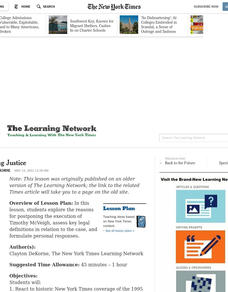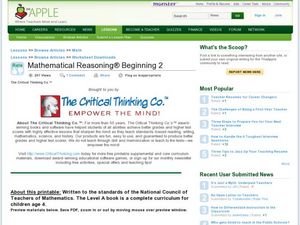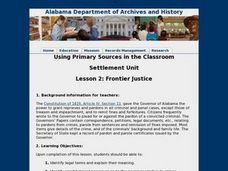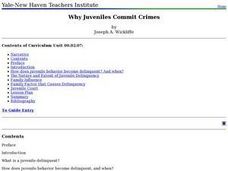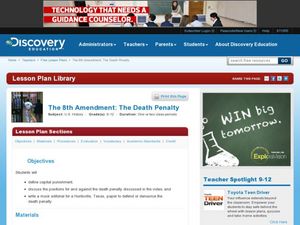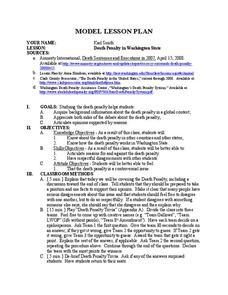Curated OER
Teachers: Citizenship: Criminal Justice System
Pupils, in groups, study Asbos and their conditions. After watching a 10-minute video, they answer questions in the Asbo hotseat. Also, they develop arguments that are not necessarily their own.
Curated OER
Executing Justice
Students explore the reasons for postponing the execution of Timothy McVeigh, assess key legal definitions in relation to the case, and formulate personal responses.
Curated OER
Mock Trial
Students rewrite a traditional fairy tale to represent the viewpoint of the villain. They participate in a mock trial of that villain in which all regular court participants (judge, jury, defendant, witnesses, plaintiff, etc) play roles.
Ken Taylor
The Stones: Guilty or Not Guilty?
Young drama pupils will perform a number of expressive speaking exercises as they consider the themes of responsibility, consequences, and justice in the very modern Australian play The Stones. With a lot of role playing and...
Curated OER
Critical Thinking Problems
Young mathematicians practice their reasoning as well as adding and subtracting skills with this worksheet that includes five simple word problems about birthdays. Learners are give pictures of birthday cakes and based on the number of...
Curated OER
Hydraulic Mining Offline Lesson
Students utilize a variety of source materials to explore reasons for supporting or opposing hydraulic mining. A mock court hearing is held where a decision to allow the continued use of hydraulic mining is made.
Curated OER
The Jury System
Students analyze Article III and the Seventh Amendment. For this US Justice lesson, students research the US jury system and complete a Student Jury questionnaire. Students will discuss the impact the implementation of the Jury System...
Curated OER
dsfa
Students work in groups examining the school's policy of no weapons on school property.
Curated OER
Parental Accountability and Public Policy
Students examine laws that relate to parental accountability for minors. Students debate these laws and identify their own personal opinions regarding parental civil and criminal liability. Students draft legislation that reflects their...
Curated OER
Who Serves Time? Breaking Down Stereotypes About Juvenile Offenders
Students read and discuss article "Doing Time," explore juvenile justice system and juvenile hall, and discuss stereotypes of young offenders.
Curated OER
Frontier Justice
Students make an investigation into the Constitution of 1819, Article IV, Section II, gave the Governor of Alabama the power to grant reprieves and pardons in all criminal and penal cases, except those of treason and impeachment, and to...
Curated OER
Plea Bargaining
Students explore plea bargaining and list the advantages and disadvantages of it.
Curated OER
Why Juveniles Commit Crimes
Students examine the reasons why juveniles commit crimes. As a class, they watch movies showing juveniles committing crims and discuss the impact on societies. They take a field trip to adult and juvenile courts and compare their...
Curated OER
Is it Legal? - The Judicial System
Fourth graders explore the judicial branch of government; in particular, Florida's judicial branch of government.
Curated OER
White Collar Crime
High schoolers discuss difference between crimes of deceit versus crimes of violence, define white-collar crime, and examine far reach of white collar crime laws. Students then analyze what differences exist between rationales for...
Curated OER
The 8th Amendment: The Death Penalty
Students take a closer look at the death penalty. For this U.S. government lesson, students watch a Discovery video about capital punishment in the United States and then compose letters to the editors of newspapers about their stance on...
Curated OER
Total English Upper Intermediate: Crime Issues
In order to build discussion skills, English language learners use a worksheet with several questions regarding crime and punishment in the justice system. They interview fellow classmates, noting how each feels about a given topic. They...
Curated OER
Racial Profiling
Students debate both positions on the controversial topic of racial profiling with support for each and then develop a consensus position on how racial profiling as a law enforcement tool should be used.
Curated OER
Guilty to a Fault
Learners consider the moral and legal issues involved in distinguishing a verdict of murder from one of manslaughter (criminally negligent homicide) and write an essay describing the issues involved in the case that was researched.
Curated OER
Studying the Food Pyramid
Students explore the food pyramid and how to eat a healthy diet. In this nutrition lesson, students use pictures to make charts of food from the different food groups, record the food they eat throughout the day, investigate the...
Curated OER
The Death Penalty
Students examine how people are punished in the American justice system. In groups, they identify the four different theories of punishment and how it is used in the justice system. They use the internet to read arguments for and against...
Curated OER
What is a Court?
Students examine and discuss the judicial branch of the U.S. government. They define what a court is, list three characteristics of a trial court and an appellate court, and analyze various trial and appeal situations.
Curated OER
Bill of Rights and Lawmaking
Ninth graders consider how the Bill of Rights impacts the lawmaking process in the United States. In this Bill of Rights lesson, 9th graders discuss the amendments and their limitations. Students research the role of the Legislative...
Curated OER
Tort Liability: Mock Trial
Students explore the trial process and the tort concept of host liability.



